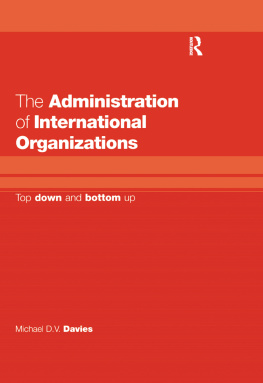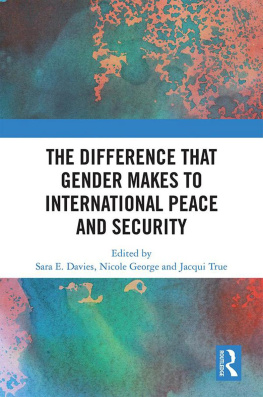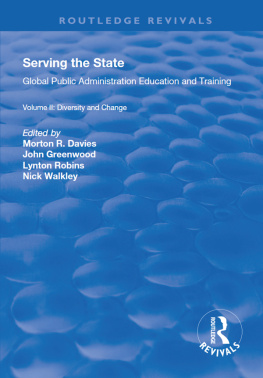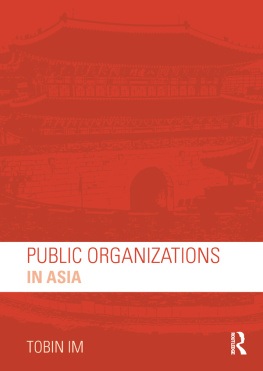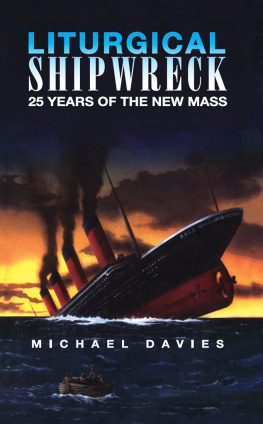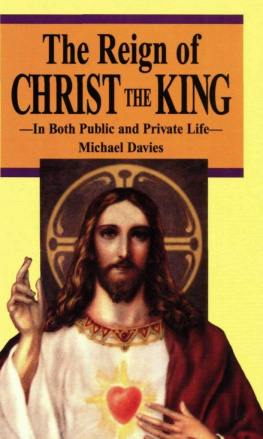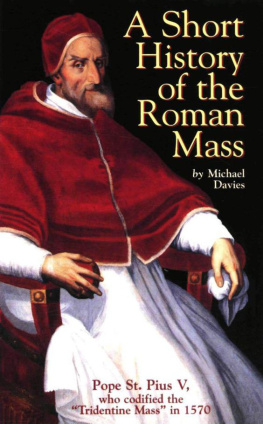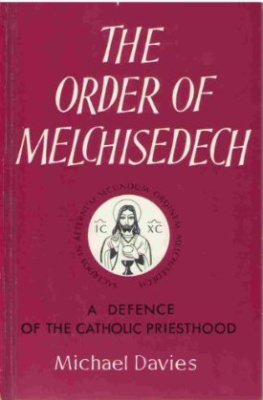First published 2002 by Ashgate Publishing
Published 2017 by Routledge
2 Park Square, Milton Park, Abingdon, Oxon, OX14 4RN
711 Third Avenue, New York, NY 10017, USA
Routledge is an imprint of the Taylor & Francis Group, an informa business
Copyright Michael D.V. Davies 2002
The author has asserted his moral right under the Copyright, Designs and Patents Act, 1988, to be identified as the author of this work.
All rights reserved. No part of this book may be reprinted or reproduced or utilised in any form or by any electronic, mechanical, or other means, now known or hereafter invented, including photocopying and recording, or in any information storage or retrieval system, without permission in writing from the publishers.
Notice:
Product or corporate names may be trademarks or registered trademarks, and are used only for identification and explanation without intent to infringe.
British Library Cataloguing in Publication Data
Davies, Michael D. V.
The administration of international organizations : top down and bottom up
1.International agencies - Management
I.Title
352.1'1
Library of Congress Cataloging-in-Publication Data
Davies, Michael D.V.
The administration of international organizations : top down and bottom up / Michael D.V. Davies.
p. cm.
Includes bibliographical references and index.
ISBN 0-7546-0905-7
1. International agencies--Management. I. Title.
JZ4850.D38 2002
352.11--dc21
2002019414
ISBN 13: 978-0-7546-0905-6 (hbk)
As could be expected, this book would not have seen the light of day without the help and advice of a number of people and institutions. Those who have generously provided of their time and efforts are acknowledged below in the chronological order of their involvement in this project, which in no way reflects the relative importance of any contribution.
I would like to thank Roger Eggleston, Secretary to the United Nations Consultative Committee on Administrative Questions (CCAQ), who gave valuable commentary on the first draft, updated my knowledge of administrative changes in the UN system and in particular provided information concerning UN common system reform initiatives.
Also, Helge Semb, the Executive Director for Norway at the Inter-American Development Bank (IDB) who, early on, encouraged me to continue with the work, secured assistance from the Royal Ministry of Foreign Affairs, Government of Norway, and provided detailed comments on the third draft. This is the second time that Helge has played an instrumental part in bringing to fruition a book on international organizations, the other being: The Multilateral Development Banks by Percy Mistry. I hope it will not be the last.
Ingrid Glad and her colleagues at the Royal Ministry of Foreign Affairs, Oslo, provided critical financial and material support to complete the final round of research. In particular, Kari Hirth secured the co-operation and participation of the Organization for Economic Co-operation and Development (OECD). I personally regret that Norway is not a member of the European Union (EU) as, had they been, I might have had equivalent access to its administration. Unfortunately my own government was unable to open the doors of that institution, which is one of the most closed or perhaps more charitably, most reticent, of the international organizations from an administrative perspective.
My thanks also to Ron Mclnnes, his assistant Anna-Marie Dreyfus and his senior management colleagues at OECD who, during my visit, gave generously of their time to explain their administrative policies and reforms.
The participants in a Norwegian round-table organized by Ingrid Glad and Helge Semb, provided me with highly relevant and substantive critique and were directly instrumental in suggesting a final structure for the book. On a personal basis I mention with pleasure the participation of Arne Tostensen of the Christian Michelsen Institute, Bergen, an old friend who shared an office with me, 25 years previously, when we both worked in Kenya for the UN Food and Agriculture Organization (FAO).
I also acknowledge the contribution of Keith Bezanson, Director of the Institute for Development Studies, University of Sussex (IDS), for allowing me access to the research facilities at IDS and for his personal advice in ensuring that there was a degree of academic rigour in the final draft. I owe a double debt to Keith, who was also Administrative Manager at IDB, in my early years at that institution, and who was a great example of what a good international manager should be. I hope this final product meets his high standards.
For their help in the final production stage of this book I acknowledge the contributions of my wife, Joan, for carefully proofreading the text (while suppressing her urge to yawn) and the staff of Ashgate Publishing for their assistance in preparing it for publication.
I would also like to thank the many colleagues who have, over the years, provided me with the material, which has formed the basis for this work. In most cases this material has been supplied as part of a broad working co-operation, which exists as a result of my having worked in several organizations. My thanks too to the library staff of: IDB, the International Monetary Fund (IMF), the British Library, IDS and the University of Sussex, all of whom have been unfailingly courteous and co-operative in providing assistance.
The quotation on , is reproduced from the 29 July 1998 edition of The Financial Times, with permission, under the terms of their copyright licence fee. While every effort has been made to obtain copyright permission one request has remained unanswered.
Despite all the help I have received, I must stress that the responsibility for the opinions expressed in this work and any errors is mine and mine alone; although in some cases (and particularly in respect of the comments concerning senior management) my opinions often reflect the broad views of the staff of the institutions in which I have worked.
Michael Davies
Kingham
Oxfordshire

